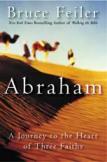Our Father
Following up on his popular Walking the Bible, Bruce Feiler, journalist and travel writer, now presents his very personal exploration of monotheism’s common patriarch in Abraham: A Journey to the Heart of Three Faiths. The importance of his topic—the identity and meaning of Abraham—is both ancient and contemporary. Indeed, within hours of the Iraqi war’s beginning, an Iraqi spokesman located the hits they were taking “around Ur, where prophet Abraham was born.” Former president Jimmy Carter invoked Abraham’s name as well, when he wrote of the Middle East conflict in his book The Blood of Abraham. And many are the interfaith dialogue groups and gatherings that invoke his name as the reason for possible common ground among the three monotheistic religions.
But as Feiler points out, the reasons for contemporary thinkers to invoke the memory of Father Abraham is perhaps less interesting than the reasons why Judaism, Christianity and Islam all chose him when they first articulated their respective stories: “At every transitional moment in the evolution of religion, each subsequent incarnation of monotheism chose to link itself back to the same man.” Although the historical data about Abraham’s life are few, Feiler energetically applies himself to the task of following the narratives and meanings of Abraham in Judaism, Christianity and Islam. With each, he seeks to answer why this patriarch captured the imaginations of their respective foundational thinkers. Thus Feiler’s subtitle: “A Journey to the Heart of Three Faiths.”
Alternately scholarly and personal in choosing his sources—the author calls, for instance, on the Scripture scholars Jon Levenson and Carol Newsome, and then on the local Catholic priest where he grew up and the rabbi who marked his bar mitzvah—Feiler engagingly takes the reader to the geographical and imaginative worlds that must all be visited for a full understanding of the patriarch. On occasion, one might quibble about the breezy way Feiler approaches his subject. On the one hand, for example, he notes the lack of (famous) Hollywood representations of Abraham: “the real story of Abraham is actually closer to an old-fashioned buddy picture involving him and God,” or he tells us that Carol Newsome is “a petite, fair-haired Alabaman with a Harvard Ph.D.” On the other hand, for a popular introduction to this both ancient and contemporary central figure, such personal impressions help move the narrative along.
Feiler paces his chronicle well with personal conversations and impressionistic comments. In the end, the reader comes to know not only the respective literary depictions of Abraham in Judaism, Christianity and Islam but also how imaginatively each tradition has re-understood and used him for their own doctrinal purposes. Certainly Feiler is not a biblical scholar, but he has engaged some of the right people. He has interpreted them correctly and translated them appropriately for the more popular audience he seeks, and deserves, to reach.
As his journey unfolds, Feiler relates the stories about Abraham with colorful language and deftness. But as the book progresses he becomes more befuddled and frustrated: Is there no solid historical foundation on which all religions can agree? In the end, he concludes that while Abraham is not merely a theological Rorschach image from which any interpretation may be drawn, nonetheless Abraham’s richness lies precisely in the marvelous variety of stories and interpretations that he has generated through the centuries. At the end of Feiler’s research and travels, one Christian interlocutor tells him that he has discovered “a giant figure, who holds our joint [Jewish and Christian] expectations in his life and whose character we both see as representing the best of ourselves...and now let’s find a Muslim. The three of us will do the same, and we’re on the way to solving the problems of the world.”
Well, maybe. But for the general reader trying to find the meaning and shape of Abraham today, Feiler’s short, accessible book is a very good place to start.
This article also appeared in print, under the headline “Our Father,” in the April 28, 2003, issue.








